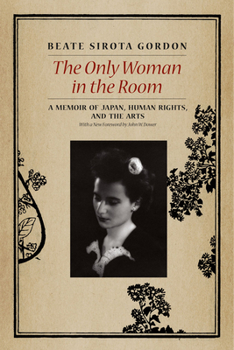The Only Woman in the Room: A Memoir of Japan, Human Rights, and the Arts
Select Format
Select Condition 
Book Overview
In 1946, at age twenty-two, Beate Sirota Gordon helped to draft the new postwar Japanese Constitution. The Only Woman in the Room chronicles how a daughter of Russian Jews became the youngest woman to aid in the rushed, secret drafting of a constitution; how she almost single-handedly ensured that it would establish the rights of Japanese women; and how, as a fluent speaker of Japanese and the only woman in the room, she assisted the American...
Format:Paperback
Language:English
ISBN:022613251X
ISBN13:9780226132518
Release Date:April 2014
Publisher:University of Chicago Press
Length:176 Pages
Weight:0.57 lbs.
Dimensions:0.4" x 6.1" x 8.9"
Customer Reviews
5 ratings
Fascinating Book on Many Levels
Published by Thriftbooks.com User , 14 years ago
Beate Sirota Gordon (BSG), the author of this easy to read autobiography, had a fascinating life. Not only do you learn about her interesting talented family, but you experience WWII and the Japanese aspect of it from an unusual perspective. Of Austrian parents who moved to Japan prior to the World War, BSG was in college in the US when the war broke out. She was separated from her parents at this young age and had no idea what had happened to them for years. Because of her ingenuity and talents, especially with languages, she became part of MacArthur's team, and eventually became the person responsible for writing the women's section of the new Japanese Constitution. BSG's ideas regarding women's rights even surpassed those of the US Constitution in those times and to some extent even today. A very worthwhile book to read for any one interested in history, human endeavors and women's issues, written by The Only Woman in the Room.
Important piece of modern history. Deserves reprinting
Published by Thriftbooks.com User , 16 years ago
In Oct. 2007 I had the privilege of hearing Ms.Gordon speak at a renowned women's college in Tokyo. Now in her 80s, Ms. Gordon traveled from her home in the US to visit again the country of her youth, Japan. She spoke in Japanese for over an hour, giving a summary of her life, but most importantly, stressing the importance of the Equal Rights Clause of Japan's consititution, which by quirk of fate she had written. The Only Woman in the Room, a brief memoir, which includes her contribution to the history of post-war Japan, is refreshingly modest. For some 50 years after the Pacific War, the details of the drafting of Japan's constitution by the 'allied powers' (General MacArthur) had been kept quiet, much of it classified secret documents. To the world, appearances were kept as if the Japanese had drafted their own constitution, but in reality it was strictly managed by MacArthur. Given the prevailing gender chauvinism of Japan (and even the west) at that time, if Ms. Gordon and another woman (economist Eleanor Hadley) had not been present, articulate, and assertive, there would possibly have been no 'equal rights clause' set forth in Japan's constitution. Had Ms. Gordon not had experience growing up in Japan, fluency in the language and knowlege of the plight of women, equal rights in Japan might have taken many more years to arrive. Speaking before a group of future women leaders of Japan, Ms. Gordon was living testimony to the fact that today's Japanese women have rights of marriage, divorce, voting, owning property, etc., which was not true prior to 1946. It seems she has always been the type of person so involved in living life that to stop and record all of it in detail would have gotten in the way of living it. Certainly her biography would be a sweeping epic, from her parents' roots in Russia, her father's respected talent as a musician and teacher, through the chaos of the war in Europe, loss of family in Hitler's halocaust, her parents' surviving the war as "non-persons" in Japan, her US college education, her linguistic contributions to the war effort, and so on. Despite all this, I believe perhaps Ms. Gordon does not view herself as being that different from thousands of others who lived through those years, but she did have extraordinary talent and the luck to be in the right place at the right time.
A story worth telling
Published by Thriftbooks.com User , 17 years ago
I first learned of Beate Sirota Gordon from a Japanese woman friend who told me she was well loved by the women of Japan. They know she is responsible for insisting that they have a voice in their democracy. Unlike the previous writer, I found her straight forward prose to be very readable. She may not have a fancy literary style, but its her story and I appreciate the way she told it.
An amazing book from an amazing lady!
Published by Thriftbooks.com User , 21 years ago
I found this book to be inspiring. A book not to be missed!
Fascinating account of feminist victory in feudal Japan
Published by Thriftbooks.com User , 25 years ago
Ms. Gordon, born in Vienna and educated in Japan and the United States, found herself by an accident of history in Japan at age 22 with the American Occupation Forces immediately after World War II. General MacArthur directed her and others to draft a new constitution for Japan. Drawing on European constitutions that she found in the remaining libraries in war-torn Tokyo, she wrote for Japanese women an advanced equal rights clause that Japanese women have treasured ever since. The story of how the Japanese constitution was written is extremely interesting and well-written. Readers interested in Vienna and in European social activity of the early 20th Century will also find interesting descriptions of same. Mrs. Gordon's father was a famous Russian pianist who associated with many other famous pianists of his era, such as Artur Rubinstein.




